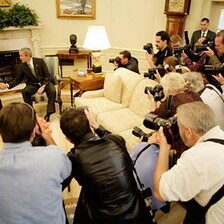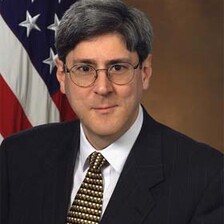Palestine Report 6 January 2005

U.S. President Bush, one of the leading actors in the Israeli-Palestinian conflict “Theater of the Absurd”
A review of the past year provides a number of skits from a particularly inspired performance. It featured a telephone call from a senior Israeli official inquiring about Yasser Arafat’s failing health (“I do hope it’s not serious,” he said. “Is there anything we can do?”), a US president who publicly warned Iran about “the dangers of meddling in Iraq,” a US State Department envoy who toured the region talking about democracy (“Islamists will not be included,” he opined), and a CNN anchor who informed viewers that Arafat’s death would mean a violent succession struggle in the West Bank and Gaza - but was then reminded that the last political assassination in the region took place in 1996. In Israel.
The current year promises no contrary coda to this absurdity. While the passing of Arafat provoked public relief in Washington, US officials were loathe to criticize a man whom they grudgingly described as “the last great revolutionary of the twentieth century,” and the administration expressed its “deepest condolences to the Palestinian people.” Arafat’s death, George Bush said, however, marked “a significant moment” in the history of the region and provided “a real chance for peace.” With Arafat’s death, he said, the international community could guarantee that there would be a Palestinian state. Such a state could finally be established, he optimistically predicted - “in 2009.”
That this “significant moment” came and went in barely the blink of an eye may have come as a shock to Middle East leaders, but it was hardly news in Washington. At a private dinner in the Washington home of a prominent policymaker, a gathering of former and current Middle East analysts reviewed the administration’s views on the Israeli-Palestinian conflict and concluded that very little progress would be made during the years ahead. Surprisingly, the reasons given for this prediction had less to do with the influence of the administration’s pro-Israel neo-conservatives, or the succession of a new Palestinian leadership, than it did with the “thin calculus of constituent politics” that motivates the White House.
“The administration is enervated by their fear of failure,” a former White House advisor noted during the dinner. “They have learned a lesson from the Clinton’s Camp David meeting - the chance of failure outweighs any international reward for success. Everyone knows that a solution to the conflict means the US has to push Israel. But every administration always asks the same question: ‘yeah, okay, we can push Israel - but what’s in it for us?’ And the answer is always the same: ‘not a damn thing.’” One of the attendees at the dinner, former National Security Advisor Zbigniew Brzezinski, was even more blunt: “The truth is that the United States cannot do for Israel and the Palestinians what they are not willing to do for themselves.”
Brzezinski’s blunt assessment is a simple restatement of what is becoming known as “the Lewis rule,” named for former US Ambassador to Israel, Samuel Lewis. When asked why the US didn’t simply “impose a solution” on the Israelis and Palestinians, Lewis uttered one of Washington’s unalterable political truths: “Because when people say that we should ‘impose a solution’ on the parties to the conflict,” he said, “what they really mean to say is that we should impose a solution on Israel. And that we cannot do. It is political suicide.”
For Lewis, “the third rail of American politics” - touch it and die - is not social security but the Israeli-Palestinian conflict. “We simply cannot deal with it. We don’t know how.” Put another way, while the US authors’ windy phrases on their support for peace, in true theatre-of-the-absurd tradition such statements are devoid of any content. The US simply will not promote a solution to the conflict that the two parties will not accept: Israel will not accept having to give up its largest settlements and the Palestinians will not accept anything less. The result? “Paralysis,” Lewis says.
The cries of outraged protest over this conclusion might be heard from sea-to-shining-sea, but all the signs of non-involvement are there. When Mahmoud Abbas succeeded Arafat as head of the PLO, George Bush sent outgoing Secretary of State Colin Powell, a man with no mandate and even less real power, to meet with him. “When Bush shoved off in his new ship,” a Powell colleague says, “the Secretary of State was the first one to walk the plank.”
When British Prime Minister Tony Blair arrived in Washington with a plan for an international conference on the conflict, Bush endorsed it wholeheartedly - then added that the US did not need to be present. “What’s embarrassing is that Tony is not the least bit embarrassed,” a former Blair Middle East negotiator reflected. Worse yet, when Blair returned to London he announced that (since Israel said it also would not be attending) his conference would be transformed into a session on Palestinian reforms, a viewpoint that left Prime Minister Ahmad Qureia cold: the new Palestinian leadership was not that interested in another lecture on democracy, he said.
Hard as it might be to believe, the great hope for George Bush’s second term - that he will, as he pledged just six short weeks ago, make “resolving the Israeli-Palestinian conflict a top priority of the next administration” - has been extinguished. The current diplomatic interplay on the conflict is filled with conventionalized, stereotyped, and meaningless exchanges.
“It’s just in the too-tough box,” a former Clinton administration Middle East expert says. “Bush and his aides have simply concluded that a hope and a prayer are far safer than doing something and failing.” But in a city filled with out-of-work Middle East analysts whose advice is now diligently ignored, this do-nothing policy is fraught with immense and bloody dangers. “The lesson in this is quite simple, and it’s one that Arafat knew all too well” one of these officials, a former deputy assistant secretary of state for the Near East says. “If you want the US to deal with this issue you can’t remain silent. You can’t sit on your hands and say ‘no violence, no violence, I’m not even in favor of throwing stones.’ Because the truth is that sometimes the only thing that Washington understands is pain.”




